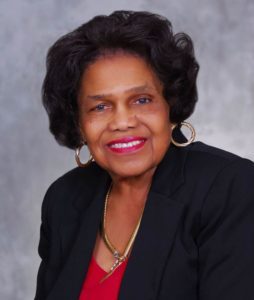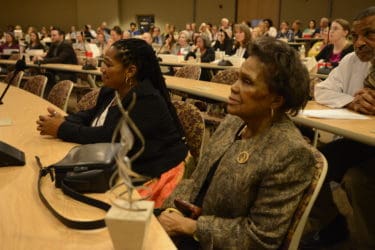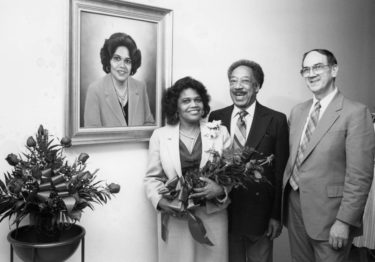Edith Irby Jones, M.D., who became a pioneer when she enrolled at UAMS in 1948 as the first African American to enroll in an all-white medical school in the South, and who went on to a distinguished career as a doctor, educator and philanthropist, passed away on July 15. She was 91.
“All of UAMS is deeply saddened to hear that Dr. Jones has passed away,” said UAMS Chancellor Cam Patterson, M.D., MBA. “She shook the world when she enrolled at UAMS in 1948, and we will honor her by recognizing that the journey she started is not done.”

“Dr. Jones has had a dramatic, lasting impact on health care that will never, ever go away,” Patterson said. “She was a tremendous woman, and she opened so many doors for minority students. We are forever in her debt. I would like to extend my heartfelt sympathies to Dr. Jones’ family and to all those here at UAMS who counted her as a mentor and friend.”
“Our beloved alumna was a courageous trailblazer, not only during her time as a student at UAMS, but in the decades since then as she dedicated her career to the underserved,” said Christopher T. Westfall, M.D., FACS, executive vice chancellor of UAMS and dean of the College of Medicine. “We are profoundly grateful for all that she gave and everything she accomplished throughout her lifetime.”
“We are deeply saddened by the loss of Dr. Edith Irby Jones, but encouraged by her international legacy of service,” said Brian Gittens, Ed.D., M.P.A., vice chancellor for diversity, equity and inclusion. “Her life embodied Dr. Martin Luther King’s call that ‘Life’s most persistent and urgent question is, ‘What are you doing for others?’ We are honored to uphold her tremendous legacy of service in our efforts to advance diversity, equity and inclusion at UAMS and beyond.”
Edith Mae Irby was born near Conway in 1927 to Mattie and Robert Irby. Her father, a sharecropper, died when she was 8, and her older sister died of typhoid fever at the age of 12, largely due to her impoverished family’s lack of access to medical attention. Jones herself had rheumatic fever as a child and was unable to walk or attend school for a year. These experiences prompted her to seek a career in medicine, with the goal of helping those who could not afford standard medical care.
According to her official biography in the National Library of Medicine, Jones recalled, “The children who were able to have medical care would live; I saw the doctor going in and out of their homes. Although it may not be true, I felt that if I had been a physician, or if there had been physicians available, or we had adequate money, that a physician would have come to us.”
When Jones enrolled at UAMS in 1948, there were 6,500 medical students in the country, but only 185 were African American – and nearly all of them attended historically black colleges. Jones ranked 28th out of 230 applicants to UAMS that year, and H. Clay Chenault, M.D., then dean of the College of Medicine, made the decision to desegregate medical education and accept her. That year, the University of Arkansas Board of Trustees voted to increase the class size by one, so that it could not be said by those in the public who opposed the decision that Jones was somehow “taking a spot” from a white person.
Although she had been accepted to attend classes, Jones faced death threats and intimidation, and was not allowed to use the same dining, lodging or bathroom facilities as other UAMS students. Resisting the segregationist rules, many of her classmates chose to eat with her and study with her at her apartment.
During her second year of school, Irby and Dr. James B. Jones married; they subsequently had three children. In 1952, Jones received her Doctor of Medicine degree and was accepted to complete the first residency by an African American at a hospital in Arkansas.
Myra Jones Romain, Jones’ daughter, spoke in September on her mother’s love of UAMS.
“Her first love has always been UAMS, because she realized that they were taking a big leap of faith in admitting her,” Romain said. “She made a commitment to make sure that she did her part, not just to finish, not just to graduate, but to go forward after graduation and do something.”
She would receive financial help from the community as a show of support, Romain said, such as a quarter taped to a piece of cardboard from members of her church. Once, when she was missing $50 for tuition, Daisy Bates collected the amount for her in a coffee can.
“She never forgets that,” Romain said. “She recognizes that there were a lot of people behind her getting her here, and there were people here who had to then say, ‘Okay, we’ll open the door.’”
After graduation, Jones opened a general practice in Hot Springs before moving to Houston, Texas, and became the first African American woman intern at Baylor College of Medicine Affiliated Hospital. She maintained her practice in Houston’s “third ward” for several decades, serving those who could not afford to go anywhere else for medical care.
In 1985, Jones was elected the first female president of the National Medical Association, and was the only female founding member of the Association of Black Cardiologists. She taught, consulted, or provided health care in not only the United States but in Haiti, Mexico, Cuba, China, Russia and throughout Africa. Jones continued teaching and practicing medicine at the University of Texas Medical School and the Baylor College of Medicine until 2014.

Among her many awards and honors, Jones was inducted into the UAMS College of Medicine Hall of Fame in 2004 and was inducted into the inaugural class of women honored by the Arkansas Women’s Hall of Fame in 2015.
In addition to her distinguished medical career, Jones was also an activist for civil rights, working with Dr. Martin Luther King Jr. as part of the civil rights movement. She was the only physician and female member of the so-called “Freedom Four,” who spoke across the South in homes and churches encouraging people to join the civil rights movement.
UAMS honored Jones in September with a month-long celebration of her life and career, with three events sponsored by the Center for Diversity Affairs: a historical presentation and exhibit; a four-woman discussion panel; and luncheon attended by Jones and featuring M. Joycelyn Elders, M.D., former U.S. surgeon general, as keynote speaker.
In a statement read at the celebration, Gov. Asa Hutchinson said, “Edith Irby Jones was a skilled and compassionate healer who demonstrated exemplary courage in breaking through racial and gender barriers, and her ongoing commitment to providing health care to those in need had a positive impact on the lives of countless individuals.”
“This African American woman, 5 feet tall, was a giant,” said Erick Messias, M.D., associate dean for faculty affairs, at the historical presentation.

“There are going to be days where you don’t feel like you necessarily belong,” said Sasha Ray, an SNMA regional director and third-year student, at the four-woman panel. “But there’s always a quiet strength in the back of my mind, of knowing that I am participating in the tradition of a long line of women of color, of black women here at this institution, who have asserted their right to take up space. Dr. Jones was the genesis of that.”
Elders, an emeritus professor of pediatrics and distinguished professor of public health, was the first African American, second woman and first Arkansan appointed as U.S. surgeon general. She was inspired to become a doctor in 1950 after hearing Jones give a lecture at Philander Smith College.
“I’ve been following her ever since,” Elders said. “Before that time, I came from the cotton fields in southern Arkansas. I thought that if I got out of the cotton patch, that would’ve been real progress, but after that day, all I wanted to be was just like Dr. Irby.”
During the ceremonies, a scholarship was established in Jones’ honor by retired Maj. Gen. Elder Granger, M.D., a distinguished alumni in the College of Medicine. To make a donation in support of the Edith Irby Jones, M.D., Scholarship, visit www.giving.uams.edu/EIJScholarship.
In a 2006 interview with the David and Barbara Pryor Center for Arkansas Oral and Visual History, Jones said she learned her greatest life lesson from her father on the day he died.
“The greatest lesson I’ve ever learned, [which] I learned from my father, is that indeed what you give, comes back in multiples,” Jones said. “He told me then, ‘Edith, you don’t get it back all at that time, but when you give, you do get back in multiples – but it may not come back at the same time nor from the same source that you give it.’ And that has been my philosophy in life – never fail to give – expecting it to come back from the same source or that it might come back immediately.”


